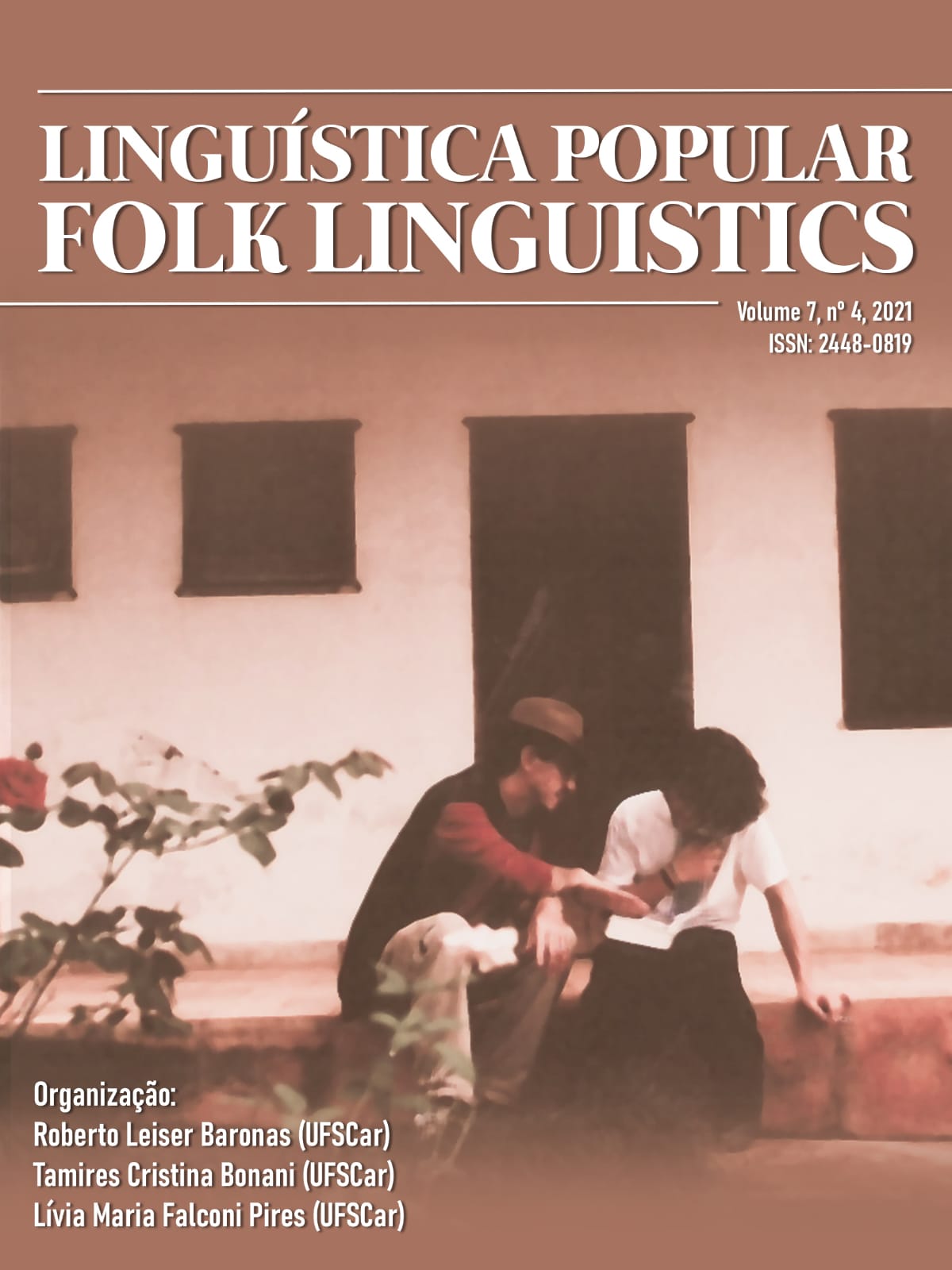Novas discursividades para a linguística popular
os comentários on-line sobre uma língua
Abstract
Since the advent of web 2.0, Internet users have occupied the digital space, taking a stand on a wide range of topics, one of which is language itself. Interested in exploring some potentialities that the Digital Discourse offers to the field of the Folk Linguistics, this study aims to propose and test the fecundity of the territory of online comments produced by non-linguist Internet users about a language. Considering the potential trigger of polemics (AMOSSY, 2017) on terms that are beyond what is considered “normal” in the language (NIEDZIELSKI; PRESTON, 2021), there were selected internet users’ online comments in response of on-line news that discuss the phenomenon of the incorporation of terms such as crush and shippar, typical of the theme of relationships in the digital age, in Brazilian Portuguese. It was observed, according to Jara Murillo (2021), the marks of judgments, signs of belonging to a certain group, traits of loyalty and linguistic insecurity and types of argumentations mobilized. In addition, the analysis used the discursive categorization proposed by Paveau (2020) of prescriptive, descriptive, interventionist or militant metalinguistic practices. It is concluded, with the analytical exercise undertaken, that, although some typical details of data collection from open interviews can be lost, the on-line comments bring the potential of recovering spontaneous knowledge of the language produced also in a spontaneous way and at real environments by non-linguists. And it can also cover the debates engendered among internet users due to the web's afordances.
Key-words: Folk Linguistic; Digital Discourse; Web 2.0; On-line comments; Relationships in the digital age.
References
BARONAS, R. L. O amargo da língua de Bolsonaro: discurso e linguística popular. Grácio Editor: Portugal, 2021.
BARONAS, R. L.; CONTI, T. B. Notas sobre a possibilidade de um trabalho no carrefour epistemológico entre a linguística popular e os estudos do discurso. Fórum Linguístico, v. 16, n. 4, p. 4285-4294, 2019.
BARONAS, R. L.; COX, M. I. P. Linguística popular/folk linguistics e linguística científica: Em vez do versus, propomos a integração. Fórum Linguístico, v. 16, n. 4, p. 4254-4256, 2019.
DOLAR, K. Os dicionários colaborativos on-line: objetos metalinguísticos profanos. In: BARONAS, R. L.; GONÇALVES, M. R. B.; SANTOS, J. A. B. Linguística Popular: contribuições às Ciências da Linguagem. Araraquara: Letraria, 2021, pp. 111-131.
DOURY, M. “Ce n’est pas un argument!”: Sur quelques aspects des théorisations spontanées de l’argumentation. Pratiques: Linguistique, littérature, didactique, n. 139-140, 2008, p. 111-128.
GONÇALVES, M. R. B. On Mario de Andrade’s Folk Linguistics. Cadernos de Linguística, v. 2, n. 4, p. e490, 27 Aug. 2021.
JARA MURILLO, C. V. El español de Costa Rica según los ticos. Un estudio de lingüística popular. San José: Editorial de la Universidad de Costa Rica, 2006.
JARA MURILLO, C. V. Linguística Popular: o espanhol na Costa Rica segundos os ticos e alguns centro-americanos residentes no país. In: BARONAS, R. L.; GONÇALVES, M. R. B.; SANTOS, J. A. B. Linguística Popular: contribuições às Ciências da Linguagem. Araraquara: Letraria, 2021, pp. 25-77.
HOENIGSWALD, H. M. A Proposal for the Study of Folk-Linguistics. In: BRIGHT, W. (ed.). Sociolinguistics. The Hague: Mouton, 1966, pp. 16-26.
NIEDZIELSKI, N.; PRESTON, D. R. Folk linguistics. Berlin: De Gruyter Mouton, 2000/2003.
NIEDZIELSKI, N. A.; PRESTON, D. R. Pragmática Popular. In: BARONAS, R. L.; GONÇALVES, M. R. B.; SANTOS, J. A. B. Linguística Popular: contribuições às Ciências da Linguagem. Araraquara: Letraria, 2021, pp. 12-23.
MAINGUENEAU, D. Das razões para ler Ressignificação em contexto digital. In: PAVEAU, M. COSTA, J. L. BARONAS, R. L. (Orgs.) Ressignificação em contexto digital. São Carlos: EDUFSCar, 2021, pp. 9-14.
MORALES DA SILVA, M.; CARREON, R. O. “Glossário da paquera digital”: definição de termos nativos da web por não-linguistas. In: BARONAS, R. L.; GONÇALVES, M. R. B.; SANTOS, J. A. B. Linguística Popular: contribuições às Ciências da Linguagem. Araraquara: Letraria, 2021, pp. 132-144.
PAVEAU, M.A. Os pré-discursos: sentido, memória, cognição. Campinas: Pontes editora, 2008.
PAVEAU, M. A. Não linguistas fazem linguística? Uma abordagem antieliminativa das ideias populares. Policromias - Revista de Estudos do Discurso, Imagem e Som, v. 3, n. 2, p. 21-45, 2018.
PAVEAU, M. A. Linguística Folk: uma introdução. Organizado por Roberto Leiser Baronas, Tamires Cristina Bonani Conti e Julia Lourenço Costa. Araraquara: Letraria, 2020.
PAVEAU, M.A. Análise do Discurso Digital: dicionário das formas e das práticas. Campinas: Pontes editora, 2021a.
PAVEAU, M.A. (2021b) A ressignificação na web social: princípios teórico-metodológicos. PAVEAU, M. COSTA, J. L. BARONAS, R. L. (Orgs.) Ressignificação em contexto digital. São Carlos: EDUFSCar, 2021, pp. 19-58.
Downloads
Published
How to Cite
Issue
Section
License
Os autores concordam com os termos da Declaração de Direito Autoral, que se aplicará a esta submissão caso seja publicada nesta revista (comentários ao editor podem ser incluídos a seguir).

